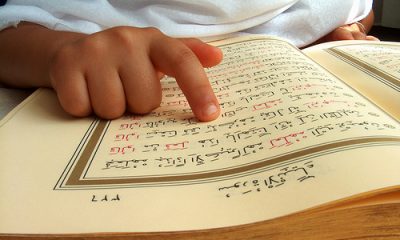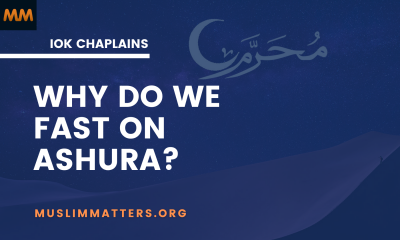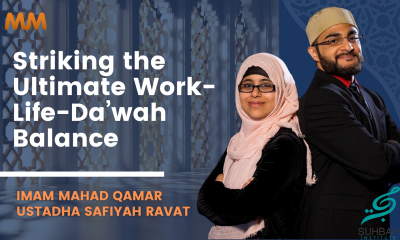#Islam
Lesson 12 From Surah Al-Kahf
Tafsir of Verses 83-98
Published
Alhamdulillah last session we were able to explore the meanings of verses 71-82. InshAllah tonight we’ll cover the meanings and lessons of verses 83-98. Just as a quick reminder the last passage of the Surah dealt with a very unique and interesting episode from the life of Musa 
In this next set of verses, Allah 
Ibn ‘Abbas 
- سلوه عن ثلاث، فإن أخبركم بهن فهو نبي و إن لم يفعل فالرجل متقول
Keep supporting MuslimMatters for the sake of Allah
Alhamdulillah, we're at over 850 supporters. Help us get to 900 supporters this month. All it takes is a small gift from a reader like you to keep us going, for just $2 / month.
The Prophet (SAW) has taught us the best of deeds are those that done consistently, even if they are small. Click here to support MuslimMatters with a monthly donation of $2 per month. Set it and collect blessings from Allah (swt) for the khayr you're supporting without thinking about it.
Ask him about the young men who left their city in the distant past and what happened to them, because this is a unique event. Ask him about the person who traveled the East and the West and what happened to him. Ask him about the spirit and what it is.
So they came back and posed these three questions to the Prophet ﷺ. The Prophet ﷺ told them that he would reply to them the next day expecting Allah ﷻ to send down revelation, but he forgot to say inshAllah. Allah ﷻ didn’t send down any revelation for the next fifteen days (one narration says 3) and the Quraysh began to assume that he didn’t know the answers and that his claims to prophethood were false. After 15 days Allah ﷻ revealed the entire Surah and reminded the Prophet ﷺ to always say InshAllah.
This is the fourth story mentioned in the Surah after the story of the people of the cave, the owner of the two gardens and the story of Musa (as) and Khidr. Allah ﷻ introduces the story by saying,
Verse 83: They ask you about Dhul-Qarnain. Say, “I shall now recite to you an account of him.”
Meaning the Quraysh asked you about Dhul Qarnain after consulting with the Jews of Madinah so tell them you will now recite some of his story to them that will answer their question.
Who was Dhul Qarnain?
The Quran doesn’t tell us the exact identity of Dhul Qarnain, why he was given that name, and what time period he lived in or the exact location of his travels and rule. All these details are extra and unnecessary and immaterial; no aspect of our belief or action depends on knowing these details. However, the commentators do get into discussions regarding these details in an attempt to present historical facts. So we’ll go through a brief discussion about who he was and his time period.
Some historical narratives mention that there were four people who ruled over the entire known world of their respective times, 2 believers and 2 non-believers. Throughout history, there have been a few people who were given the name Dhul Qarnain and interestingly they all had the title Alexander as well. Some people held the opinion that the Dhul Qarnain mentioned in the Quran is the famous Alexander the Great, the Greek who had Aristotle as his teacher. Although he fits the description of having ruled the East and the West he can’t be the Dhul Qarnain mentioned in the Quran because he was a non-believer. This is the conclusion of ibn Kathīr.
According to ibn Kathīr, Dhul Qarnain lived during the time period of Ibrahim (as) and he also mentions that Khidr was his minister. Other researchers are of the opinion that the Dhul Qarnain mentioned in the Quran is the ancient Persian king Cyrus the Great. In modern times this theory has been given more weight because of supporting evidence. As for the name Dhul Qarnain, it literally means “the person with two horns”. The name is due to his having reached the two ‘Horns’ of the Sun, east and west, where it rises and where it sets” during his journey. The following is what the Quran tells us about him.
Verse 84: Surely, We gave him power on earth and gave him means to (have) everything (he needs).
Meaning, Allah 
Verse 85-86: So he followed a course until when he reached the point of sunset, he found it setting into a murky spring, and found a people near it. We said, “O Dhul-Qarnain, either punish them or treat them well.”
He traveled towards the West until he reached where the sun sets, to the extreme west beyond which there was only an Ocean, which was most likely the Atlantic. There he found the sun setting into dark, muddy spring, meaning that it looked as if the sun were setting into the Sea. Depending on our own geographic location the sun seems to set into different places within the horizon. For example, from our perspective sometimes it looks like the sun is setting into the ocean, or behind a mountain or into the sand.
At this location, there was also a nation of disbelievers. So Allah 
Verse 87-88: He said, “As for him who does wrong, we shall punish him, then he will be sent back to his Lord, and He will punish him with severe punishment. As for the one who believes and acts righteously, he will have the best (life) as reward, and we shall speak to him politely in our directions.”
This is an expression of his justice; Dhul Qarnain was a just ruler who ruled according to the dictates of faith, belief, and righteousness. Those who were presented with the truth, Islam, and then chose to consciously reject it would be punished in this world and then Allah will punish them in the next. And as for those who accept Islam, who affirm faith in Allah, His prophets and the last day and do righteous deeds will be rewarded. When those who do well in the community, pursuing a fair line of action in all their pursuits, receive a good reward for their actions, and when the unjust and oppressors receive a fair punishment and humiliation, then the whole community is motivated to follow the line of goodness. But when matters go wrong, and the unjust, oppressor and corrupt people are the ones who enjoy favor with the ruler, while those who are good and fair are persecuted, then the ruler’s power becomes no more than a tool of corruption and misery for the whole community. Nothing remains fair. The whole society sinks into chaos. He established peace and justice and this location and then decided to travel towards the East.
Verse 89-90: Thereafter, he followed a course until when he reached the point of sunrise; he found it rising over a people for whom We did not make any shelter against it.
Then he travelled towards the East and there he found a group of people who were not used to the ways of advanced people. They didn’t have homes or shelter or clothes to protect against the sun. These people were also non-believers so he dealt with them in the same way as he dealt with the previous people. He employed the same policy of fairness and justice and building a society on faith.
Verse 91: Thus it was, and Our knowledge fully comprehends whatever (wealth and equipment) he had with him.
Ibn Kathīr writes that the early commentators Mujahid and As-Suddi said, “This means that Allah knew everything about him and his army, and nothing was hidden from Him, even though they came from so many different nations and lands. For, ﴿لاَ يَخْفَى عَلَيْهِ شَىْءٌ فِي الاٌّرْضِ وَلاَ فِى السَّمَآءِ﴾ truly nothing is hidden from Allah in the Earth and in the heaven. After establishing justice and peace he decided to move north.
Verse 92-93: Thereafter he followed a course until he reached between the two mountains, he found by them a people who were almost unable to understand anything said.
Then he traveled towards the North until he reached a point between two mountains. There he found a nation of people who were barely able to understand what he was saying because of their foreign language. They said to him through a translator or through some other means.
Verse 94: They said, “O Dhul-Qarnain, the (tribes of) Ya’jūj and Ma’jūj (Gog and Magog) are mischief-makers on the earth. So, should we assign a payment for you on condition that you make a barrier between us and them?”
These people recognized that Dhul Qarnain was a fair and just ruler so they asked him for help against the menace of Ya’jūj and Ma’jūj. Ya’jūj and Ma’jūj is the name of a tribe of people. There’s a lot of speculation regarding who exactly they are and what area or region they’re from, but nothing can be said with certainty. They complained to Dhul Qarnain saying that they spread mischief and corruption in our lands by killing and destruction. If we pay you some money will you build a barrier between them and us to prevent them from reaching our town?
Verse 95: He said, “What my Lord has (already) given in my control is better (for me than the payment you are offering to me), so help me (only) with strength, and I shall make a barrier between you and them.
Basically, he told them that he doesn’t need their money, but he will need their help. Meaning, Allah ﷻ had given him such great wealth and power that he had no need of what they could offer him. He would provide this service simply for the sake of righteousness and doing good.
Verse 96: Bring me big pieces of iron.” (They proceeded accordingly) until when he leveled (the gap) between the two cliffs, he said, “Blow.” (They complied) until when he made it (like) fire, he said, “Bring me molten copper, and I will pour it upon this.”
So they brought pieces of iron and filled the space between the two mountains with it. Then they made this iron really hot and poured molten copper over it making a huge metal structure.
Verse 97: So they (Ya’jūj and Ma’jūj) were not able to climb it, nor were they able to make a hole in it.
They weren’t able to climb it because of its height nor were they able to make a hole in it because of its depth and strength. After building this giant barrier Dhul Qarnain said,
Verse 98: He said, “This is a mercy from my Lord. Then, when the promise of my Lord will come, He will make it leveled to the ground. The promise of my Lord is true.”
Meaning his ability to build such a strong and impenetrable barrier was a mercy from Allah ﷻ; it had nothing to do with his own strength or ability. The “promise of my Lord” is referring to the onset of the events that will lead to the Hour; the Day of Judgment. This includes the trials of Dajjāl and the return of ‘Isa 
There are many sings of the Day of Judgment mentioned in the Quran and Ahādīth of the Prophet 


- عَنْ أَنَسٍ، قَالَ قَالَ رَسُولُ اللَّهِ صلى الله عليه وسلم “ بُعِثْتُ أَنَا وَالسَّاعَةُ كَهَاتَيْنِ ” . قَالَ وَضَمَّ السَّبَّابَةَ وَالْوُسْطَى .
Hudhaifah 

Two of the greatest trials, greatest fitnahs, this Ummah will face before the Day of Resurrection is the fitnah of Dajjal and the attack of Ya’jūj and Ma’jūj. Both of these are major signs of the Day of Judgment and will happen very close to each other. There’s a very lengthy hadīth recorded in Sahīh Muslim narrated by Al-Nawwās ibn Sam‘ān 
Allah 
Another narration from Abu Sa’eed Al-Khudri 
The narration of Al-Nawwās tells us that while this is happening, ‘Isa (as) and his companions will turn to Allah asking him to remove their distress. Allah 

From other narrations, we learn that Ya’jūj and Ma’jūj have already made a hole in their wall. Zainab bint Jahash 

- عَنْ زَيْنَبَ بِنْتِ جَحْشٍ، أَنَّ النَّبِيَّ صلى الله عليه وسلم اسْتَيْقَظَ مِنْ نَوْمِهِ وَهُوَ يَقُولُ ” لاَ إِلَهَ إِلاَّ اللَّهُ وَيْلٌ لِلْعَرَبِ مِنْ شَرٍّ قَدِ اقْتَرَبَ فُتِحَ الْيَوْمَ مِنْ رَدْمِ يَأْجُوجَ وَمَأْجُوجَ مِثْلُ هَذِهِ ” . وَعَقَدَ سُفْيَانُ بِيَدِهِ عَشَرَةً . قُلْتُ يَا رَسُولَ اللَّهِ أَنَهْلِكُ وَفِينَا الصَّالِحُونَ قَالَ ” نَعَمْ إِذَا كَثُرَ الْخَبَثُ ” .
In a narration recorded in Tirmidhi Abu Hurairah 

Keep supporting MuslimMatters for the sake of Allah
Alhamdulillah, we're at over 850 supporters. Help us get to 900 supporters this month. All it takes is a small gift from a reader like you to keep us going, for just $2 / month.
The Prophet (SAW) has taught us the best of deeds are those that done consistently, even if they are small. Click here to support MuslimMatters with a monthly donation of $2 per month. Set it and collect blessings from Allah (swt) for the khayr you're supporting without thinking about it.
Shaykh Furhan Zubairi was born in 1983 in Indianapolis, Indiana. Shortly thereafter, he moved and spent most of his youth in Southern California, graduating from high school in Irvine in 2001. He began his pursuit of Islamic knowledge and spirituality at the Institute of Knowledge (IOK) in 1998, where he started the memorization of the Qur’an and studied the primary books in the Islamic Sciences and Arabic language. After starting college, he took a break and went to Karachi, Pakistan, for 9 months to complete the memorization of the Qur’an at Jami’ah Binoria. He returned home and completed his B.S. in Biological Sciences from the University of California, Irvine in 2005. He then traveled to Egypt to further his studies of the Arabic language. Thereafter, his pursuit of Islamic knowledge led him back to Pakistan, where he completed a formal ‘Alamiyyah degree (Masters in Arabic and Islamic Studies) at the famous Jami’ah Dar Al-’Ulum in Karachi. He has obtained numerous ijazat (traditional licenses) in the six canonical books of hadith, as well as the Muwata of Imam Malik and Imam Muhammad, and has also received certification in the field of Islamic Finance. Shaykh Furhan Zubairi serves as the Dean of the Full-Time and Part-Time Seminary Programs at the Institute of Knowledge in Diamond Bar, CA. He also serves as IOK University Chaplain for students at UCI and Community Chaplain for the local and extended SoCal Community, and he regularly delivers sermons and lectures at various Islamic Centers and events in Southern California. Learn more about Institute of Knowledge at www.instituteofknowledge.com.


“What Did You Just Say?”: A MuslimMatters Open Letter Series I Dear Avi Benlolo

[Podcast] How to Fight Islamophobia | Monia Mazigh

Little Bayramgul – A Short Story

Why Your Kids Should Not Be Huffadh

Cancer, Mum, & Me: A Story of Hardship and Ease

The Things He Would Say – [Part 2]

‘Afraa’ and Yawm al-Khulayf: A Cinderella Story

Why Your Kids Should Not Be Huffadh

Experiences, Lessons, And Reality Checks From Hajj 2024

Emotional Self-Healing: Lessons From The Quran And Sunnah

IOK Ramadan: The Importance of Spiritual Purification | Keys To The Divine Compass [Ep30]

IOK Ramadan: The Power of Prayer | Keys To The Divine Compass [Ep29]

IOK Ramadan: The Weight of the Qur’an | Keys To The Divine Compass [Ep28]

IOK Ramadan: Families of Faith | Keys To The Divine Compass [Ep27]

IOK Ramadan: Humility in Front of the Messenger | Keys To The Divine Compass [Ep26]
MuslimMatters NewsLetter in Your Inbox
Sign up below to get started










Rhea Morley learn Quran
May 23, 2019 at 12:33 AM
Masallah ! Masallh .
Wow its a amazing blog .
Shaykh Furhan Zubairi thank you to share a great great blog about Surah Al-Kahf .your voice so amazing and great explaing . i will add your blog in my favorite list .
Thanks .